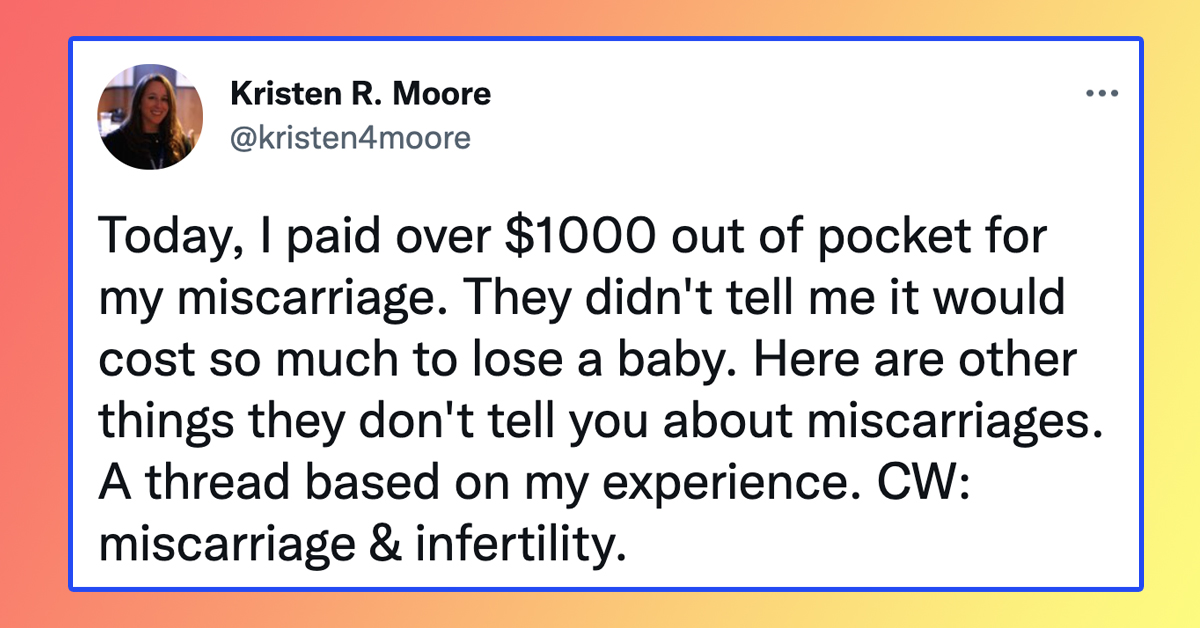Woman Shares Things Everyone Should Know About Miscarriages In Viral Thread (15 Tweets)
Miscarriages are some of the most difficult things women have to face. The hope and expectation you feel over weeks and months get replaced by a sense of loss and mourning. It’s even harder if you’ve been struggling with fertility issues.
Miscarriages aren’t all that rare either. According to the Mayo Clinic, 10-20% of pregnancies end in miscarriage. And yet it’s not a topic that many women openly talk about. This soft taboo on discussing miscarriage can lead to feelings of isolation, compounding the grief women feel.
One woman on Twitter is trying to change that.
A woman named Kristen Moore shared what she went through after having a miscarriage and her thread resonated with women who’ve gone through the same thing, often feeling alone.
She shared a list of 14 things she wanted everyone to know about having a miscarriage, whether they’ve gone through it or not. For example, miscarriage is a proccess, not an event.
1. It takes a long time. It’s not an event that’s suddenly over. It’s like a fucking marathon. A sad, dehydrated marathon with nothing on the end but empty.
— Kristen R. Moore (@kristen4moore) November 1, 2021
Supporting women who’ve had miscarriages requires a different skillset than supporting women who give birth.
2. Practitioners who support birth don’t necessarily know how to support miscarriage—the joy of birth is so stark when compared to the grief and loss of miscarriage. Some of y’all need training.
— Kristen R. Moore (@kristen4moore) November 1, 2021
Miscarriage and abortion are somewhat similar (miscarriages are also called spontaneous abortions) and the judgment that comes from the latter can affect women who’ve experienced the former.
3. There is medication to help the miscarriage along. It is used for abortion, too, and your pharmacist may treat you like you’re entering an abortion clinic when you want more information about how it works.
— Kristen R. Moore (@kristen4moore) November 1, 2021
The silence surrounding miscarriage can extend to the medical community as well and even affect treatment.
4. The most commonly used medication is officially prescribed for ulcers; all use for miscarriage management is “off books.” This gives your pharmacist permission (tacit or explicit) to deny you information about vaginal (rather than oral) use.
— Kristen R. Moore (@kristen4moore) November 1, 2021
The soft miscarriage taboo means pharmacists aren’t always helpful.
5. The informational inserts for the medication—Misoprostol—warn you about how it can trigger miscarriage. If you have a decent pharmacist, they’ll give you supplemental information that they print off from the internet.
— Kristen R. Moore (@kristen4moore) November 1, 2021
Miscarriages—and pregnancy—can feel even more stressful if you’ve been struggling with fertility issues.
6. When you’ve been through infertility treatments, a natural pregnancy doesn’t always feel like a miracle. Sometimes it feels like a tightrope walk, a risk, a pain waiting to happen.
— Kristen R. Moore (@kristen4moore) November 1, 2021
Losing a pregnancy is an isolating experience, something too many women go through alone.
7. Miscarriage is so, so lonely. Y’all. The emptying of your body like that…bless it. You really DON’T want to talk about it, but you sometimes want to scream about it. Where can we go to scream?
— Kristen R. Moore (@kristen4moore) November 1, 2021
The process can cause conflicting emotions.
8. You want it to speed up and slow down all at once. Hurry, hurry, hurry up, and then no, don’t go–please don’t go.
— Kristen R. Moore (@kristen4moore) November 1, 2021
While women who have miscarriages get little support, their partners get even less.
9. Non-birthing parents are ignored in the miscarriage experience: their grief and pain and suffering is real, too.
— Kristen R. Moore (@kristen4moore) November 1, 2021
Your body doesn’t immediately snap back to normal.
10. When the miscarriage happens at 13 weeks, the weight stays on; you still have to pull out the pregnancy pants, as a reminder of your previous maternity state.
— Kristen R. Moore (@kristen4moore) November 1, 2021
Again, it’s a cold lonely experience, and the taboo on discussing pregnancy loss means most people don’t even know how to talk about it.
11. No one talks about it, so you don’t know how to talk about. People say the wrong thing, but you’re so sad that you don’t want to say, “don’t ever say that to a person miscarrying.”
— Kristen R. Moore (@kristen4moore) November 1, 2021
So a lot of people wind up saying the wrong things.
12. Related, do not recommend: “But you can try again soon, right?” upon hearing the news. Also, do not recommend: “Everything happens for a reason.” Or “This is all part of God’s plan.”
— Kristen R. Moore (@kristen4moore) November 1, 2021
Still, there are some people who know how to deal with it and they can be sources of much-needed relief.
13. There are humans who feel like little angels, the tech who asks if you want to hear the lack of heartbeat, the friend you can scream with, the partner who’ll hold you in your grief. Mostly they feel like blips on a terrible painful road.
— Kristen R. Moore (@kristen4moore) November 1, 2021
Adding insult to injury, it can be expensive too.
14. It’s expensive and painful (like birth) and at the end you don’t get anything except a bill and a new playlist called, “Shit to help you get through the baby that never was.”
— Kristen R. Moore (@kristen4moore) November 1, 2021
And that’s for the women who actually go to the doctor after having a miscarriage. Many don’t or can’t afford to.

